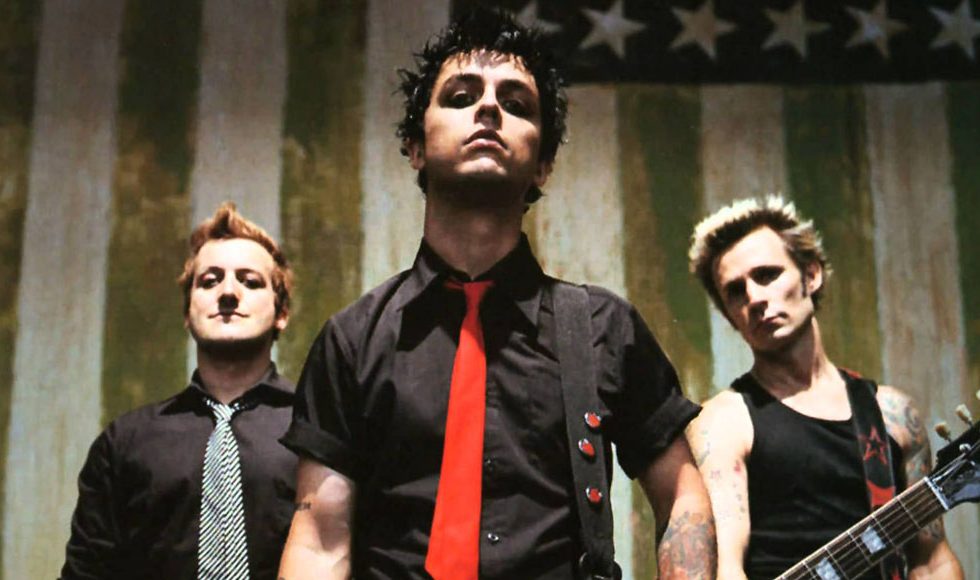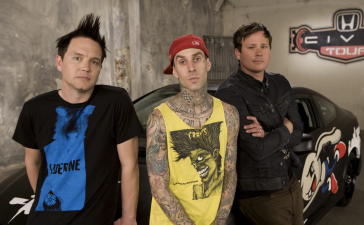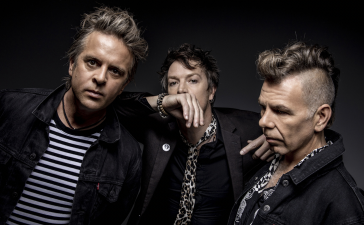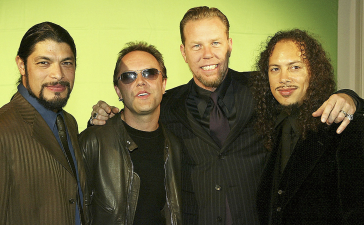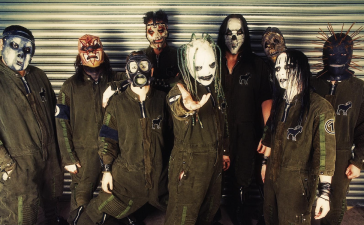Green Day have been criticised of late following the release of their thirteenth studio album Father of All Motherfuckers, which was reprehended by critics for just not being that good. Fans of the pop punk godfathers took aim at the throne after the band denounced “Swedish songwriters”, “trap beats” and “features” on their marketing campaign for the record.
In light of that, we thought it might be a good time to look back at the Green Day that we know and love, who are no strangers to suffering backlash, even on the cusp of releasing their most successful offering, American Idiot. Cast your mind back to 2004 and take a dive into the mindset of the band gearing up to the seminal release of one of the most lauded rock albums of our century.
Original Words by Matt Reekie.
“It’s very difficult to say the words Green Day, politics, concept record and punk rock opera in all the one sentence”, says an impatient Billie Joe Armstrong. I say impatient because he and bandmates Tre Cool and Mike Dirnt are currently late for rehearsal as Green Day gear up to hit the ground running with the release of their new album American Idiot. But I also sense that he’s impatient because he’s not quire sure how the world will view this latest creation by the trio, a concept record with political overtones and at least two sprawling 10-minute epics. “It’s difficult to know what people are going to think”, he bravely admits. “We’ll see what happens. I’m so satisfied with it, the feeling I have for it right now is the one I want to remember”.
About to unleash the world’s first ever punk rock opera, maybe Billie’s pensiveness is justified, though you think he’d be used to this sort of thing by now. Green Day have basically suffered a backlash of one type or another after the release of each and every one of their six previous releases, and American Idiot is their riskiest move so far.
Back in the beginning it was so much easier. There were no risks to take. 15 years ago nobody gave a shit about punk rock, there was no money in it, and certainly for the punks in San Francisco’s late-80s Gilman Street scene, little glamour. When a couple of 16-year old Operation Ivy fans formed a band, you can be sure there was no outcry, even if they did originally choose the tacky moniker Sweet Children. Same goes for when guitarist/vocalist Billie Joe Armstrong (born William Armstrong), bassist Mike Dirnt (born Michael Pritchard) and drummer Al Sobrante (born John Kiffmeyer) changed their name to Green Day and knocked out the Slappy and 1,000 Hours EPs. A few people even took notice of those. One of them was Lookout Records owner Lawrence Livermore, who had sung in The Lookouts with a young drummer named Tre Cool (born Frank Edwin Wright III). Soon after adding Tre to the line up, Green Day recorded their full-length debut for Lookout, 39 Smooth.
Up to that it had been a complete smooch-a-thon. At this stage there was no history to besmirch in the eyes of old fans, because indeed, there weren’t any old fans yet. It was only when 1992’s Kerplunk dared to be successful enough to attract major label interest that the wail of the self-righteous began. As expected, when Green Day eventually signed to Reprise Records in 1994 there was all kinds of shit slung in their direction from the underground.
“It’s very difficult to say the words Green Day, politics, concept record and punk rock opera in all the one sentence.”
The band’s answer? Dookie, the album that thrust them into the spotlight thanks to perfectly constructed MTV fodder like ‘Longview’, ‘Basket Case’ and ‘When I Come Around’. Selling over 15-million copies, Dookie took Green Day and punk to a whole new level of mainstream acceptance. Conveniently, the threesome were now perfectly placed to accept the role of scapegoat for the entire pop punk movement, as the old guard vented their displeasure at the perceived watering down of punk’s idealism and its elevation from niche musical genre to marketable concept. It seems even cracking through to challenge the links of Ace of Base and Boyz II Men on the commercial charts couldn’t win Green Day any favours.
In between ’95’s Insomniac and ’97’s Nimrod they cancelled a tour halfway through due to exhausation, and that pissed off half of Europe. Then, when Nimrod was released, they took more flak from sanctimonious former-followers for the acoustic ballad ‘Good Riddance (Time Of Your Life)’, ironically written about a disgruntled ex-fan. Hearing it played ad-nauseam around the time of the final Seinfeld episode in 1998 only exacerbated the situation.
Now on a roll, 2000’s Warning upset even more fans with its occasional experimental explorations, while the International Superhits singles collection in 2001 and the Shenanigans rarities compilation in 2002 gave fodder to naysayers eager to claim not only that Green Day had well and truly sold out, but that they were a spent force. Indeed, aside from the two token new tracks on International Superhits (‘Maria’ and ‘Poprocks & Coke’), the only new music to emerge since Warning was ‘Life During War’, a protest song made available online in March last year. Until now. “Definitely in terms of that feeling of inspiration, I don’t think we’ve ever truly nailed it anymore on any record than this one”, Billie declares.
But the inspiration certainly took its time in coming. Having regrouped in 2003, Billie, Mike and Tre originally set about trying to rediscover their passion for punk rock, laying down almost a whole new album’s worth of material. However, inexplicably, the tapes were stolen from the studo and Green Day’s hand was forced.
“After we got off tour”, explains Tre, “ideas were shaking around, songs were being written, we got a whole bunch of songs together and recorded them, but they got stolen. I won’t say we had an album complete, but we pretty much did. So we could have tried to record the same songs again, but we would’ve run the risk that by the time we put it out somebody else would’ve released the stolen bits. So we didn’t look back, we just moved on, hoping still that whoever stole them is keeping those other tapes safe.”
While you’d expect a lot of crying to follow the tragedy of months and months of hard work being lost – not to mention the anger and hurt at being ripped off by one of your inner circle – life in the studio for Green Day barely missed a beat according to Tre.
“You don’t understand how Billie works”, he says. “He is the general, he is the mad professor, he gets these ideas for songs – I’m sure he gets haunted by songs – and he’s gotta go in the studio and put it on tape. In the studio Billie thinks of the song coming out of his head and onto the tape, and nothing else.”
However, while Billie concurs that the decision to continue recording was an obvious one, the idea for a political concept album was nowhere near as cut and dried. That was decided after some impromptu studio magic from Mike.
“It took us a while to sit around and figure out what we really wanted to do between the three of us, and how to forge forward”, Billie says, before Tre picks up the story.
“Billie and I were away from the studio for a bit and Mike was asked by the producer to make up 30-seconds of music to fill time. We got back and it was super-fun, like Vaudeville, it was awful and cool. So Billie’s like, ‘Hey, I wanna try one’. Billie went in and made a 30-second song. Then I went in and made a 30-second song. Then Mike went in and did a 1-minute song, then Billie did a 1-minute song, we just kept going on that. We just kept raising the bar”, Mike adds. “In no time we had 10 minutes worth of music. That marked something new, where it was really, really fun and the creative energy was just unbelievable.”
“As each of us wrote a different part”, continues Billie, “it created this arc where all of a sudden it went from almost being a joke to being quite serious. So we looked at each other and said, ‘This is what we should be doing. Let’s do this. Fuck it’.”
The 10-minute song was gradually worked and shaped into American Idiot’s stunning ‘Homecoming’. It’s this track and equally ambitious album opener ‘Jesus of Suburbia’ that will take Green Day fans on a journey farther out than they’ve been before. If history is any judge, they’ll complain.
Still, despite the album’s moves beyond the cliched Green Day sound, there are at least five songs with commercial potential to match anything from the group’s past. Yet, American Idiot is a whole package that never sounds like the word of a band locked away trying to write hit singles.
“We didn’t really have band practice, we just went in and started putting a lot of ideas down”, Billie explains. “We started coming up with different characters like Jesus of Suburbia and St. Jimmy, and we’d put them in settings like the 7-11 in Turdtown, USA. We would sit down and actually write out where the story was heading. So you’d get to a part in the story and see a big hole and say, ‘something has to happen here’. It was like writing a novel. It was all one big thing and so it was a lot of work.”
“There are a lot of goosebump moments on this record. Things that make the hair stand up on the back of your neck…”
American Idiot’s production reflects the subject matter too. Though presented as a complete body of work, each track has been dealt with according to its own nuances. One song, ‘Extraordinary Girl’, starts with 40 seconds of tablas and percussion played by Tre and recorded with a particular ideal in mind.
“The idea was to make it sound like the last working radio in a bombed-out building in the middle of Baghdad”, Tre reveals. “I recorded that the day they dropped the mother of all bombs. That whole day I was so heartbroken, I cried my eyes out, I couldn’t believe it. What we have captured a lot of on this album is feeling and emotion. There are a lot of goosebump moments on this record. Things that make the hair stand up on the back of your neck as you think, ‘oh shit, that’s me, that’s my life’.”
Billie is quick to agree, stating that honesty was a huge issue for him in the writing of the lyrics. While the narrative is completely fictional, there is an absolute truth ringing through, probably thanks to how much of himself he has given over the concept.
“One thing was trying to overcome fear”, Billie admits. “That’s the main thing that can hold you back from writing something either political or conceptual. You think, ‘Oh, god, people are going to think I’m full of shit’. Or, ‘people are going to think I’m arrogant’. You have to deal with that stuff. You might have friends that completely disagree with what you’re doing but you have to overcome that fear and say, ‘fuck it, I’m going to let it fly.”
But while American Idiot may be construed as a cry from the heart and a plea for sanity, Billie stresses that it should in no way be associated with emo, or screamo, or whatever.
“It’s very important for me and important for our band to follow our own path and not get into any genres for lack of creativity”, he states, as he, Mike and Tre prepare to rush off to practice. “I could never see myself up there doing an emo song and crying and doing roundhouse kicks and shit like that. For me, I’m a rock ‘n’ roll person, I’ve always been that way. There’s a flamboyant thing about rock ‘n’ roll that I love, and that’s something I wanted to do on this album.”
And, despite being bitten 5 times already, Billie is still keen to see what the reaction will be.
“We’ll see what definition people come up with for it”, he laughs. “I can’t wait.”
HELLA MEGA AUSTRALIAN TOUR
with special guests The Beths
Sunday, 8th November
HBF Park, Perth
Tickets: LiveNation
Wednesday, 11th November
Marvel Stadium, Melbourne
Tickets: LiveNation
Saturday, 14th November
Bankwest Stadium, Sydney
Tickets: LiveNation
Tuesday, 17th November
Suncorp Stadium, Brisbane
Tickets: LiveNation
Thursday, 20th November
Forsyth Bar Stadium, Dunedin
Tickets: LiveNation
Saturday, 22nd November
Mount Smart Stadium, Auckland
Tickets: LiveNation


